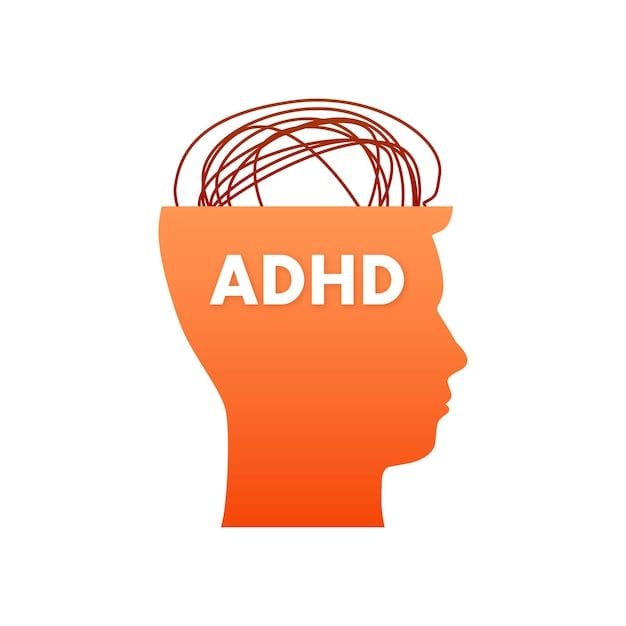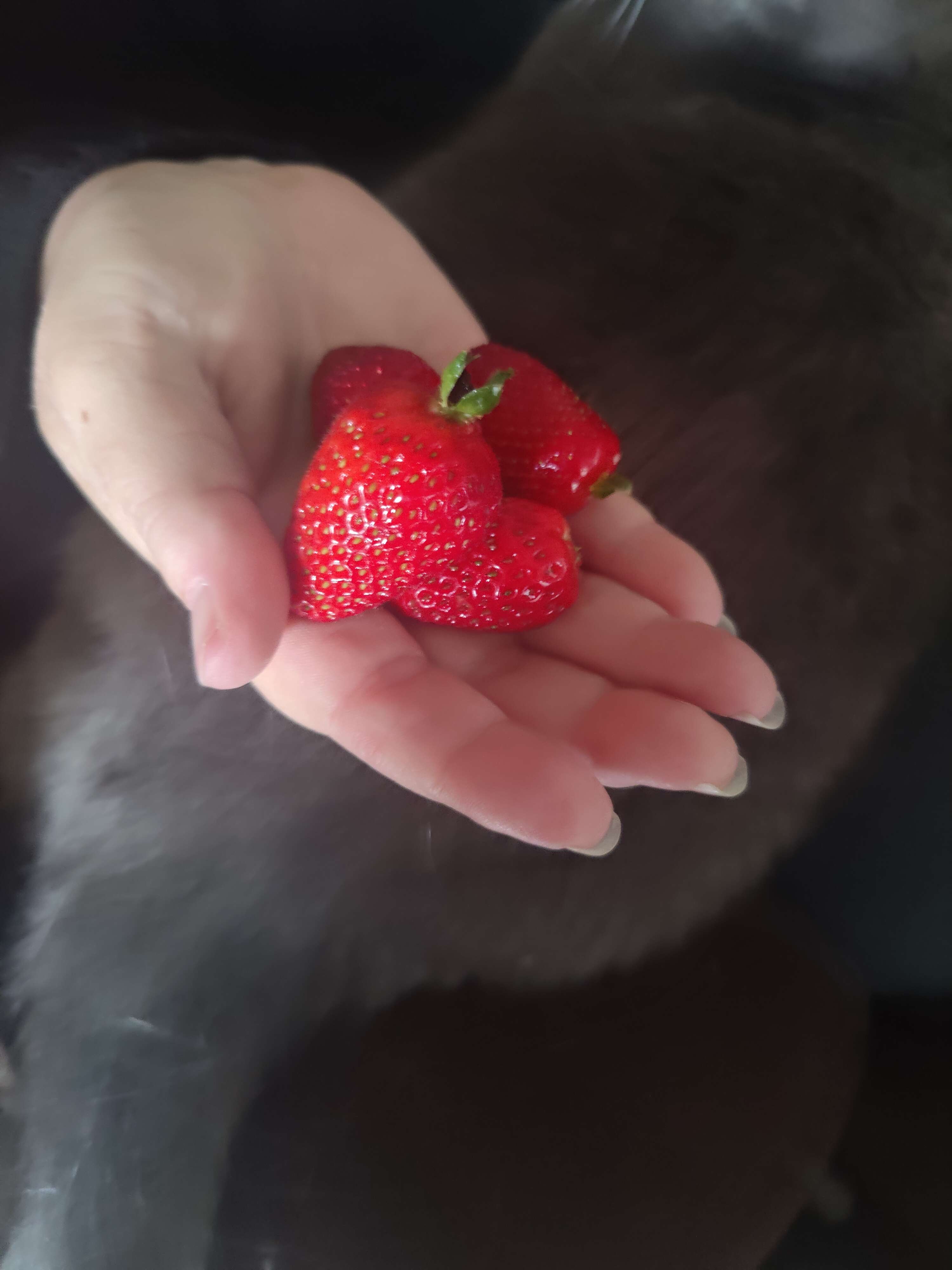Thank you Nome @NomedaBarbarian
For the visually impaired, the images are a series of Twitter screenshots.
Full transcription of text below images.
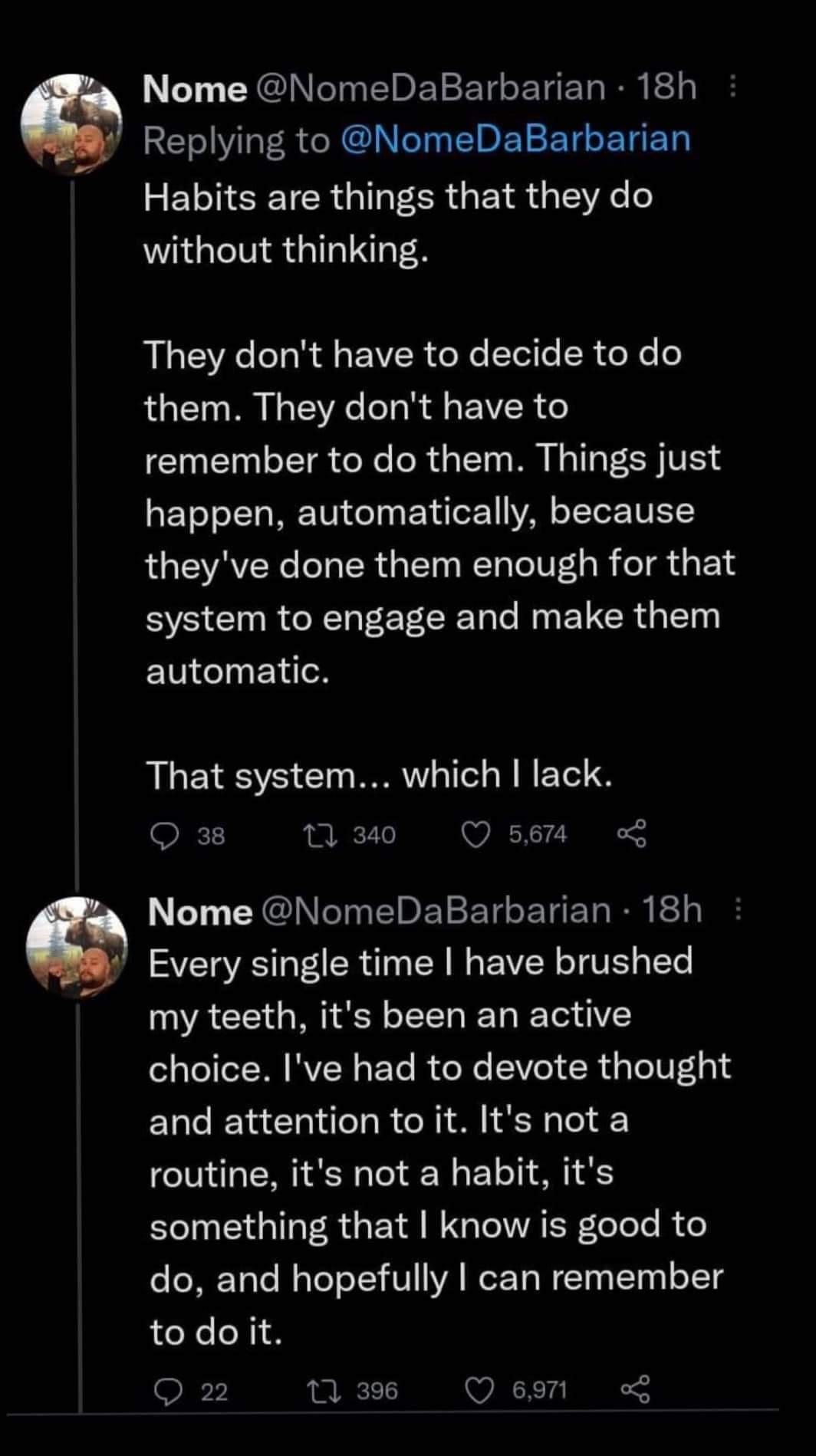
Full transcription of text below images.
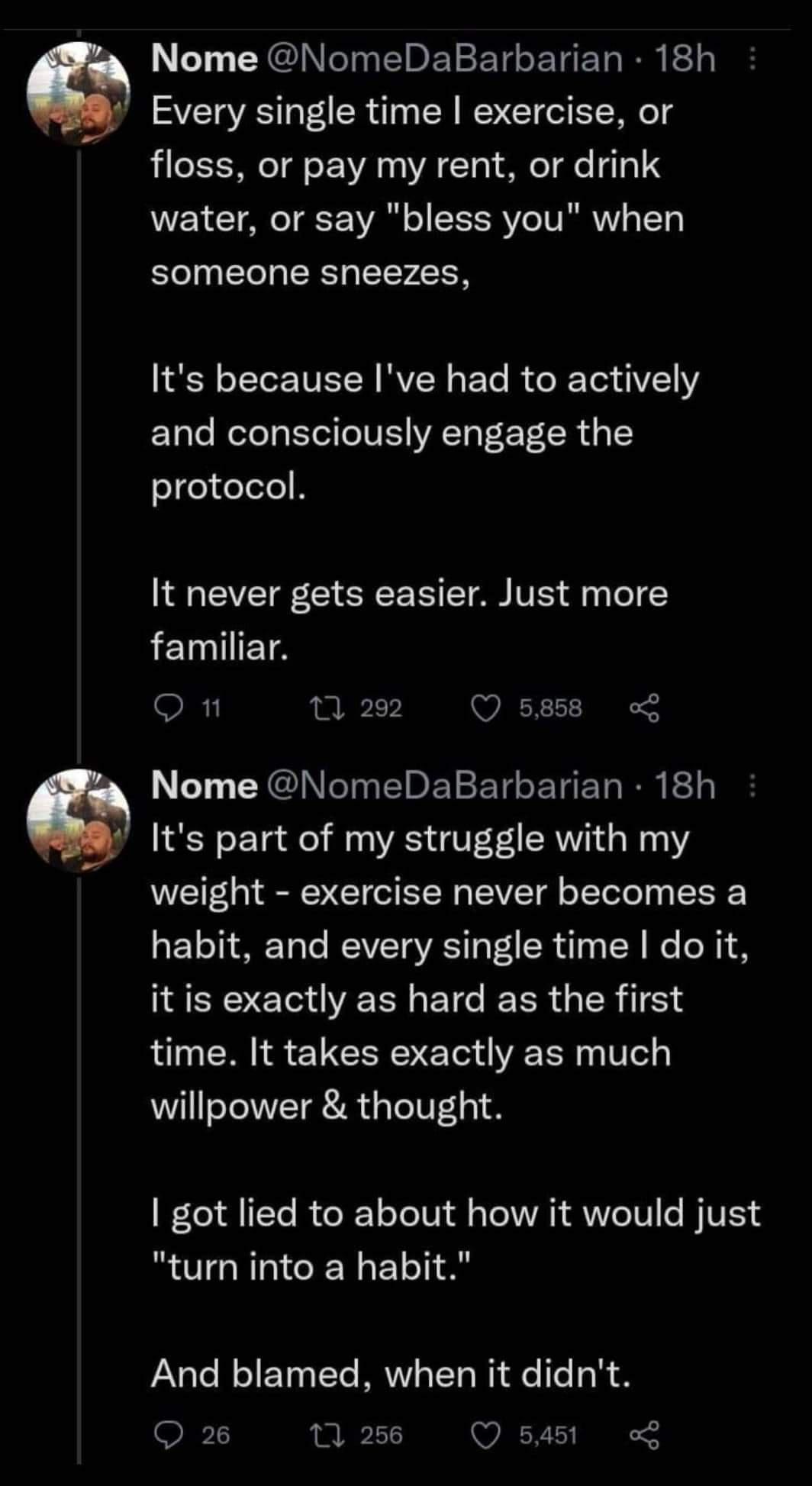
Full transcription of text below images.
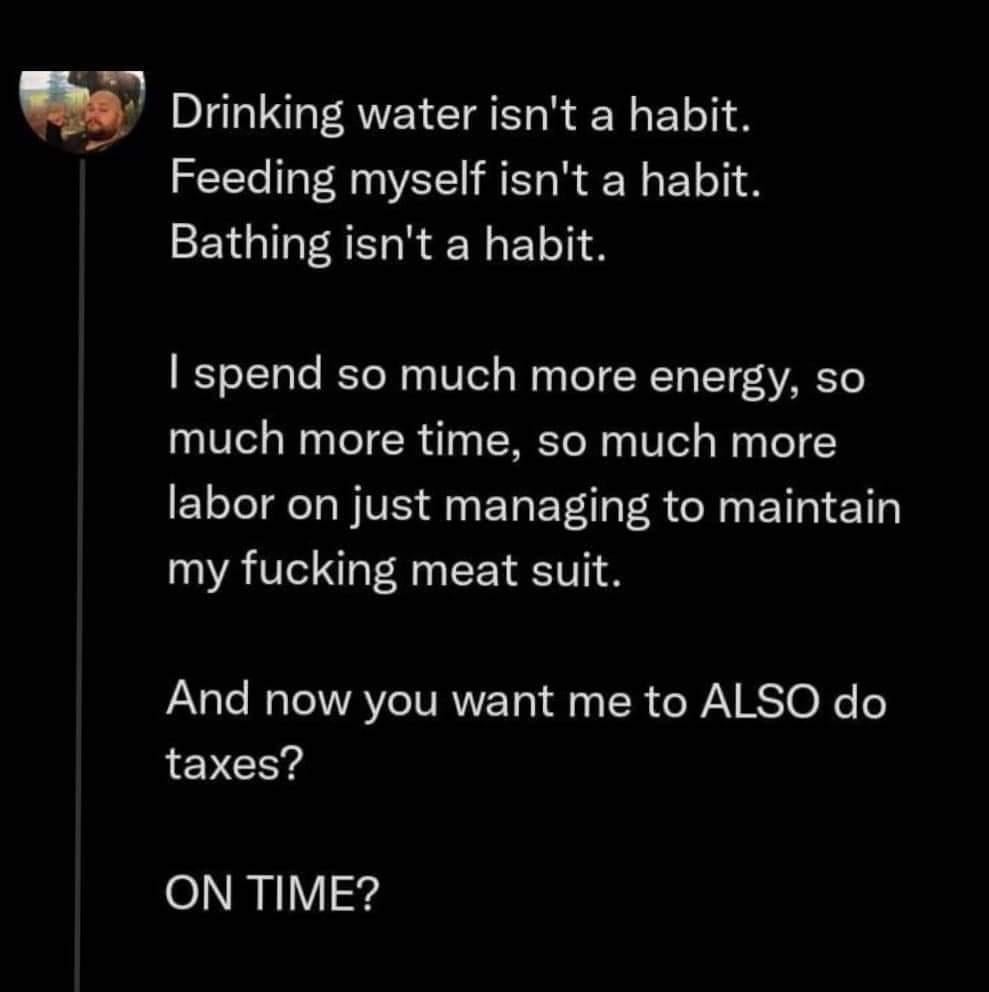
Full transcription of text below images.
@NomedaBarbarian on Twitter:
Thinking about how I’ve been lied to as an #ADHD person about what habits are.
That apparently is not what neurotypical folks get to experience.
Habits are things that they do without thinking.
They don’t have to decide to do them. They don’t have to remember to do them. Things just happen, automatically, because they’ve done them enough for that system to engage and make them automatic.
That system…which I lack.
Every single time I have brushed my teeth, it’s been an active choice. I’ve had to devote thought and attention to it. It’s not a routine, it’s not a habit, it’s something that I know is good to do, and hopefully I can remember to do it.
Every single time I exercise, or floss, or pay my rent, or drink water, or say “bless you” when someone sneezes,
It’s because I’ve had to actively and consciously engage the protocol.
It never gets easier.
Just more familiar.
It’s part of my struggle with my weight–exercise never becomes a habit, and every single time I do it, it is exactly as hard as the first time. It takes exactly as much willpower & thought.
I got lied to about how it would just “turn into a habit”. And blamed, when it didn’t.
Drinking water isn’t a habit. Feeding myself isn’t a habit. Bathing isn’t a habit.
I spend so much more energy, so much more time, so much more labor on just managing to maintain my fucking meat suit.
And now you want me to ALSO do taxes?
ON TIME?
Damn as a neurotypical person reading this it blows my mind. Yes, my habits are absolutely automatic, to the point I daydream through them. Am I just misunderstanding something or are you saying every adhd person struggles to form habits?
Jesus, that’s insane. Either I have 0 habits, or OP is right. Everything I do, I do “manually” , and have to put effort and thought into it.
Thanks for speaking to the other side, because that’s so hard to believe. I don’t know about everyone with ADHD, but it definitely seems to be a common shared experience. The only habits I do completely without thinking are a) putting my seatbelt on in the car, and b) picking my phone up like 100 times a day. Anything bigger, even something like eating, is something I have to will myself to do.
And when I’m trying to form a “habit,” like certain types of note taking or task planning at work, no matter how effective it is and how much I like it, I never manage to do it more than about 3 weeks before my brain just completely shuts off that pathway and it’s like I forget that process exists altogether.
If I don’t put my meds on my nightstand AND have a reminder on my phone, I will forget them most of the time. Daily activity, takes almost no brain power, and it still doesn’t trigger in my head as something I need to do unless I physically see it.
ugh, I constantly forget to eat. People would ask “how the hell can you FORGET to eat, for two days” and I’d be like. “three days… I think”.
My mom. Super skinny her whole life. People thought she took care of herself, but I knew that she forgot to eat for days.
I used to think that would be nice. I have the other end of it where I am constantly nibbling for dopamine hits.
Yeah. I’m super skinny. I have trouble keeping weight on. I’m 6’1, male, and like 144 lbs. It’s not good for ya.
LOL, relatable. I also had to literally train myself over years to feel hungry, and all that training goes away when I’m really stressed. Living with a partner is the best thing for my eating habits. He needs to eat, so I eat… at least once a day.
Dude. Three days isn’t even my record, and I don’t feel hungry during that time, like at all. Or if I do it’s this vaguely distant feeling that isn’t nearly as important as whatever I’m hyper focusing on at the moment.
The range of ADHD is wild, I’m just always hungry, I have to consciously stop myself from randomly eating any food in my proximity. If there’s a box of crackers, or leftovers in the fridge, I’ll eat them, even if I ate an hour ago, if I don’t make a conscious effort to remind myself that I ate a meal already. Adderall has helped with me being aware of when I’m not actually hungry, but when the drugs wear off in the evening, I have to be careful about cruising the kitchen/pantry.
A few days late, but I just stumbled across the community. I know that when I was on meds I wouldn’t eat for days. Without meds, I’m just Homer Simpson saying “ooh a piece of candy” all day
How did you train yourself to feel hungry? I need to take medicine to feel hungry and I want to take control of it
Sorry for the long message ahead :)
This is a TL;DR list I wrote to help when my cousin was struggling to eat and having stomach aches whenever he did eat:
- By medical definition, “anorexia” just means low/no appetite. Anorexia nervosa is the intentional eating disorder.
- Anorexia can cause stomach pains, especially following a meal. Fix this by eating frequent small meals or snacks.
- Cut your diet down to bland food and introduce different things in slowly or document your food intake to figure out if there are any allergies/intolerances causing you to not feel well.
- Make food a routine using external motivation to eat, such as alarms, calendar invites, or planning meals with coworkers/friends.
- Suggested rule of threes: 3 meals, 3 snacks, at least 3 hours apart. Set a timer!
- Find easy meals you can always eat. Whether it’s takeout or just something super easy to make, have a staple you can always fall back on when you don’t want to think about food. A rice cooker with a steamer basket was a game changer for me, and lately it’s been Trader Joe’s frozen foods.
Learning #1 was what made me realize my relationship with food was unhealthy and needed to change. #2-3 might not apply to your situation but I’m leaving them in case anyone else needs it.
#4 and 6 really are the answer to your question. When I got my first job out of college, I ate lunch daily with coworkers even if I had no desire to eat, which greatly helped the last thing I’ll share: I redefined what I thought of as hunger.
I realized even when I didn’t consciously feel the need to eat, my body had symptoms. I paid attention to things like lightheadedness, a tightness in my stomach, and shakiness, and started considering those to be “feeling hungry.” After forcing myself to eat more consistently and listening to my body, I actually started to feel hungry on a regular (daily-ish) basis.
Oh, and for a year or two I lifted weights 3x/week and that made me hungrier than I’d ever been in my life. The first three months I always felt hungry. But that’s a bigger commitment than the other suggestions :)
I hope this might help you!
I already do all of those things except the weightlifting, and I think burning more kilojoules would be counterproductive to my goals given I want to do the opposite. Making it easy to eat doesn’t cause me to feel a subjective sensation of hunger, and I don’t get those other signs of hunger you describe like lightheadedness or shakiness either. I get a tightness in my stomach, which my nervous system interprets as fullness and turns into a “no more eating” signal.
I’m asking how to feel hungry.
This happens to me all the time. People will ask about the last time I ate, and I’ll tell them “Uhh… I think I had a granola bar for breakfast… two days ago.” Today I ate two full(ish) meals. The last time I remember eating that much is almost three weeks ago. It’s gotten to the point where people think I’m intentionally starving myself, but I just genuinely don’t get hungry. I have no urge to eat, so I constantly forget.
My girlfriend takes me out to dinner twice a week. Most of my calories come from those two weekly nights out. Add in my time blindness and I’ll think that I ate breakfast in the morning, but then realize that it was the previous morning and that I just never noticed the passage of time.
Yeah, for thing like the seatbelt, it’s just part of the process of getting in the car, right?
Whereas with the phone, it’s the dopamine chase that our brains don’t have the right machinery to override reliably.
I never manage to do it more than about 3 weeks before my brain just completely shuts off that pathway and it’s like I forget that process exists altogether.
This is me. How can you just “forget” something you’ve developed into a routine and done daily for a month? I do though. Shit.
Oh shit the seatbelts are a great example, I’d maybe add that typing on a keyboard is another thing that feels habitual. Everywhere else the 3 month rule applies pretty well in terms of maybe picking them up and randomly immediately dropping.
Can a neurotypical chime in and say whether seatbelts and typing are habits to them like brushing teeth?
Neurotypical here. I don’t call it habits, I prefer autopilot. My autopilot is so strong that I’ve made dinner/cleaned house while on the phone without even realizing I did it. Like seriously get off the phone and look around and wondered when did I do that? I also have driven to work instead of shopping because I am so used to only leaving the house for work. You can set a clock by my daily routine down to the minute.
Oh my god
Sometimes I finish showering, and I was so heavily on autopilot while thinking about other things that I have no memory of if I actually washed my body or not, I just trust that I did
I have ADHD and sometimes when I get out of the shower I’m like, “wait: did I wash my hair?” Then I reach up to feel it and sure enough, it feels greasy; I forgot.
I can physically feel when my body isn’t clean so that’s easy (water rolls off me like a duck, LOL!). Hair is different 🤷
The more I hear about ADHD, the more I wonder if I have it. Is there something I should be doing?
If not experiencing those things would dramatically make your life better, might go see a psychiatrist about evaluation?
Doesn’t bother me, but my SO is of an other opinion
Why does your SO enter into your taking care of your mental health? This is all about YOU, if they don’t like it, they are free to leave and find a partner that does not have it. Never, fucking ever put someone else’s opinion before your well being.
I am not every ADHD person, but this could have been written by me. I had NO IDEA that you could have something be so ingrained that you don’t think about it. Even if I develop a “routine” of doing something, it is NEVER automatic. I have to put mental effort, even if small, into every task or it won’t get done.
After reading this my definition of habit would be better termed routine. I develop a routine and I try to stick to it. Also I could have a great routine and it lasts for a month or so and then it’s just, I don’t know what else to call it but ‘gone’. It’s gone. That routine is gone.
When I was in college, my GF went to a different one 100 miles away. Every Saturday, I’d get in the car and drive to her dorm, stay the night, then drive back Sunday afternoon.
One weekend, she had something she had to do, so I didn’t go. I decided to get some stuff from an art supply store half a dozen miles down the same freeway. I was about 25 or 30 miles away when I realized I had passed my exit and was just driving to my GF’s out of habit. I didn’t even remember the drive.
Auto pilot. They talk about tasks being done on autopilot, but it’s mostly a car thing (piloting a vehicle, duh). For pretty much everything I have to put effort in, but I will say that with driving something different is happening to the point where if I am driving my husband somewhere and he knows it’s part of my normal route, he will remind me SEVERAL TIMES not to take my usual turn.
What’s up with that?
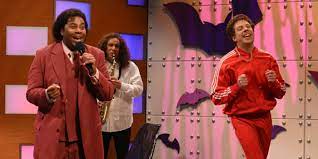
I’m not sure if it’s every ADHD person, but I have accidentally quit smoking.
If you can accidentally quit a physically addictive habit, things like brushing your teeth don’t stand a chance.
It’s very common among autistic people and neurodivergent people in general, it’s called executive dysfunction. Essentially your brain has trouble both making and initiating plans. Every time I brush my teeth I have to remember to do it (this is not automatic, all my toothbrush stuff is set up as a visual cue any time I’m near the sink), focus on my task as I go to the bathroom so I don’t forget why I went there, remember to take my medicine first so that I don’t have to swallow them after brushing my teeth, floss, and brush.
The last two parts sound very simple (and they are, which is why this is so frustrating for many people), but sometimes I will stand in front of the bathroom sink for 5 or 10 minutes, knowing I need to brush my teeth, WANTING to brush my teeth, but it’s like whatever ‘go juice’ neurotypical people have a limitless supply of is just limited for me. Finally after standing there and psyching myself up I can do it, but it does take legitimate effort to initiate the process even if I follow through on all the parts smoothly. I couldn’t tell you exactly why this happens even though I can obviously recognize that it is happening, I kind of suspect it has to do with wonky sensory integration problems (common in ADHD and autistic people).
It’s like sleep paralysis in a way - you are aware you need to do something (move / brush teeth), you want to do something or something bad’ll happen (panic / dirty teeth), you keep telling yourself to do it in your head (can’t breathe / disappoint everyone), but you just can’t make your body move.
I hate that feeling of knowing I need to do something and wanting to start, but actually doing it is like my body and mind are weighed down by concrete.
I was blown away when I first saw this meme. I had no idea habits were supposed to LITERALLY become automatic. When people would tell me “Do something every day until it becomes a habit” I thought they meant “Do something until you stop forgetting to do it” Not “do something until your body just takes over and autopilots through it and you never have to think about it again”. Now I really understand why productivity advice is so useless. They’re all designed to “hack a habit loop” and I have no habit loop.
It actually kinda pissed me off when I learned what it’s like for neurotypical people. I felt like I’ve been unfairly misled and then judged for being misled.
Wow. I honestly thought I was just lazy. Thank you for sharing. Everything other than sleep requires energy and effort. I wish I knew before I was in my 40s that I had ADHD!
Very few things are true for every person with a given neurodivergence. But this is one of the more (most?) common things that people with ADHD struggle with, some to a lesser, some to a greater extent.
As a neurotypical what I don’t understand is, how did the OP get fat in the first place, if they lack habitual behaviour?
They seem to be saying that every single time they ate junk food /fatty food, it would have been a conscious choice that they had to think about first.
Or am I misunderstanding it?
Food is different for me. When I first got diagnosed and medicated for ADHD I realised that I was ALWAYS hungry. Like always. I had never not been hungry in my life. I had been full/stuffed but hunger just does not work properly for me. Meds just suddenly made me recognise it. So I can eat my breakfast and not be craving food in ten minutes again.
Not a doctor but I reckon what I had thought was hunger was actually craving dopamine. So I was eating because I thought I was hungry and looking for the kick of sugary foods but I really just needed balanced dopamine levels
I realized when I was 20 that I can’t form habits. I’ve tried my whole life, but everything I do is an active choice, which makes it difficult to do anything at all long term. Things get boring and repetitive and after a while they aren’t interesting enough for me to get my executive functioning to do them anymore. Most things that I do daily, like brush my teeth, are actually things I do out of fear of the consequences of not doing them.
When I worked as a CS rep and had to log into my phone every time I sat down, it was a conscious effort that required active management, every day, for four years. When I get up in the morning to take care of and feed my pets, it’s an active checklist, and while I have a routine of sorts, different parts get missed often, like turning on my coffee machine, opening windows to cool the house, or even turning lights on. I’ve been on a mission to automate as much as possible in my home because things like my fish die otherwise.
The only time I’ve ever experienced auto-pilot has been while driving. And frankly, that scares the hell out of me because I lose time when that happens and have no idea if I did anything dangerous (I’m reasonably sure not because it’s happened often with others in the car, but the feeling is still there).
I can daydream through some actions, but it’s rare, and I fuck up whatever I’m doing. This is because I’m splitting my attention and not actually following a habit.
Starting any activity, including brushing my teeth, is always a conscious choice. I cannot “sleepwalk” into the bathroom to start my day.
A story here. I was in a relationship years ago, every morning this person would wake up and slap the button on their alarm. If they woke up before the alarm, or if the alarm failed, they would still reach over and slap the button. It was a habit.
I cannot develop habits like that. But I’m also not tripped up by habits. There’s no “walk down the hall and automatically turn left”.
The only upside to my particular situation is that I’ve never been hyperactive. Attention deficit, but no hyperactivity. It allows me to have at least some discipline in my day. But that has to be planned out and actively adhered to. It’s a constant struggle, but not as bad as some people I’ve known over the years.
What would you consider a habit? I’m honestly very curious. I’m trying to think what things could be done with no thoughr. My brain just doesn’t work that way.
Well the common example here has been brushing your teeth. Shits pretty automatic for me as part of my morning/night routine, I just do it, usually while thinking about other stuff. Same with other things like getting dressed, showering, going to the gym, making a sandwich, eating.
My teeth are all rotten because this has never been the case for me. It’s a chore that I have to actively decide to do every day, it’s a decision I have to make. There’s a phenomenon called “decision fatigue” that basically means you can only make so many decisions in a day before your brain just shuts down and refuses to make another one. Since neurodivergent people have to make more decisions and can’t rely on habits to lift decision making off of our shoulders we often hit that wall of decision fatigue and just kinda shut down.
If you add disincentives, like the fact that brushing your teeth is an inherently unpleasant thing to do, it can be very difficult to stick with it. Hence, rotten teeth and all of the associate health issues that come along with having rotten teeth.
This is why parents of ADHD kids have to hound them to brush their teeth even in teenage years. I won’t relate my history. I’ll just say it was not good.
My situation was compounded by some pretty extreme poverty. My family were basically transients in the eighties and we lived in campgrounds. So it’s not like they were taking me to the dentist when I had a toothache. I stayed in school though, and once I went to a field trip to a dentist and learned about teeth and gums, yadda yadda. Anyway when I came back to camp I asked my parents “Hey why don’t you guys ever take me to a dentist” and they straight up said “What? You got dentist money kid?”
lol. Ah. Nostalgia.
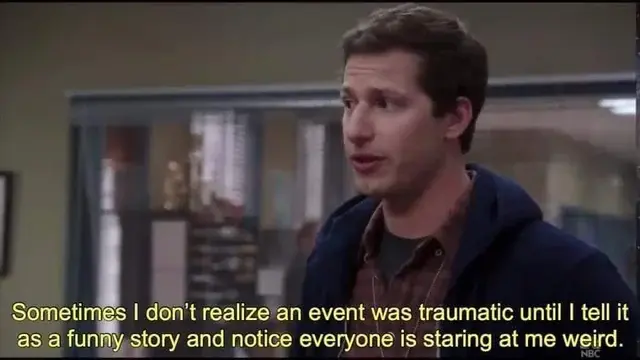
Or alternately when you tell your parents about a memory you have from growing up and they get pissy and say, “You survived”.
Sucks. I’m sorry you experienced that.
Trust me, our minds are equally blown by how your brain works. Like, what ? It’s automatic ? How does that even work? For me, automatic is things like clenching my teeth or flinching at a certain type of sound, but I wouldn’t call that a habit. For me, a habit is something I can’t stop the impulse for, like smoking. All daily practical functions are intentional or not at all. Even “routines” are just forcing yourself through the checklist, it’s never automatic. You’re like fucking robots I swear.
That gave me a good laugh. I guess I never thought of myself as fortunate in that way, fascinating. But hold on, I have another question now. What about playing musical instruments like learning guitar? Wouldn’t that constitute a habit that becomes automatic after enough practice?
I see where you’re going with this. But no. My partner is a musician. It’s a habit for him. He needs it. He plays religiously. Me though ? One day I might decide I absolutely have to learn the guitar right now, then I’d force myself through enough practice to be passable, then put the guitar down and never touch it again. Or even more likely, I’d rush out, spend $5k on gear, bring it home, set it up and by then I’ll have lost interest completely, so I’d tell myself I’ll actually play tomorrow. And then never touch that stuff again. I tell people I’m an oversharer (also an adhd thing) because there’s no room for skeletons in my closet. It’s already full of all my forgotten hobbies.
there’s no room for skeletons in my closet. It’s already full of all my forgotten hobbies.
Brilliant!!
Sorry, I’m confused. There’s no question that there are musicians with ADHD, right? So how did those musicians manage to practice and automate their playing if habit-forming is such an uphill battle?
Playing an instrument or doing art gives you a dopamine boost and gets you hyper focused. When we’re hyper focused we’re like learning superheroes as long as we’re hyper focusing on a single thing, and that thing is novel.
They choose to practice, again and again and again and again and again. And every time, it’s the same amount of effort as picking up an instrument for the first time.
I’ll hyperfocus on a new thing, like playing an instrument, or painting, or whatever and I’ll become very good at the thing very quickly. Then I’ll walk away and forget I even have an instrument, or forget that I like to paint. As a result I have a fuck ton of skills and I hardly ever use any of them. Hell, I learned book binding. I bound leather books that were gorgeous, and then after three or four I never did it again. Oh, then there was that month where I learned video editing and production, which I also never did again. I was a draftsman for awhile, where I got really good at autoCAD, and aside from a few things I did for pay I haven’t used that skill in a decade.
My hobby is also collecting hobbies. Here is how I effectively kill any new hobby. I invest money in it. I was really into pickleball last summer, played it every day, then bought a racket (I was borrowing), balls, and a bag…and scene.
Uh… No. This suggests that NTs act like drones, without any thought. Like they’re sitting on the sofa, then they just get up, wander to the bathroom, brush their teeth, then get into bed and think “wow how did I get here hahaha what a habit, eh?”
ADHD is many things but it ain’t this.
I think there’s this myth of “the neurotypical”… It’s a generic point on a scale that represents the most significant overlap, not any specific person. I genuinely believe no one is “neurotypical”, rather some tend towards it and others further away. That’s the spectrum. Plus some people might be closer to NT with some things but much further away with others.
For example, I have a pretty good degree of focus, I remember things pretty well, but I struggle to organise my thoughts and can’t bear to touch other people or certain textures. I’m sure everyone is a bit like this. Some people more so, some people less.
And that isn’t to minimise that there are people out there who really struggle to fit into the “best fit” of Neurotypical-aimed social design.
So why the need to create a mythical group of “Neurotypical”? Is it a need to define ourselves in opposition? Is it to make ourselves feel more unique? Is it a perverse form of gatekeeping?
The upshot is, that until we move towards realising that individuals have individual needs and requirements we aren’t going to make substantial progress and describing (and prescribing) otherness only seeks to alienate folk that might otherwise help.
People aren’t neurotypical… Systems are. I think that’s what I meant to say.
It’s just the ever-present need to feel unique. I feel like everyone goes through it.
As we grow up we start to notice differences between ourselves and the average person. We rationalize this by assuming we’re unique, when really we just spend a lot more time thinking about our own differences than we do thinking about other people’s.
The reason that sonder evokes such a strange feeling when it happens is because we’re usually not fully aware of the complexity of the people around us to the same degree as our own. We just pile those around us together into the category of “normal” people, while at the same time dissecting our own features to find every irregularity.
From there, we feel the need to explain the differences, usually gaining a sense of superiority, like the common “not like the other girls” sentiment, or we feel ostracized and seek to find like-minded communities to join, such as the neurodivergant groups in this case.
I’m not saying this person isn’t unusual in some significant way - I’m sure they are somehow - but this understanding of how habits work is pretty normal.
For me it is this. When I was married he didn’t understand when I would request reminders to go to the bathroom, shower, eat, do laundry. He laughed. He thought I had dementia.
Nope just adhd with a swiss cheese memory.
ACTIVATE DENTAL PROTOCOL
ERROR: BED MODE ALREADY ACTIVE. UNABLE TO ACTIVATE DENTAL PROTOCOL.
Then how do you explain that one Talking Heads song?
Not sure how meta your comment is supposed to be beyond “how did I get here?,” but ironically, David Byrne is on the spectrum.
thank you. we really really need more of this. thank you.
ND is the new introverted.
Only introverts think deeply, get anxious, or enjoy academic pursuits. Do you have a counterexample? Oh, well that person just doesn’t know they’re an introvert, so the pattern still holds!
Same with ND/NT. Nobody is neurotypical according to this definition because everyone has something they struggle with or are quirky about.
I’m sorry… What?
For neurotypicals… Habits are automated processes? Brains have that function built in?
On some days, it feels like I have to breathe and blink manually.
No, neurotypicals don’t just automatically go exercise. Its a choice they make.
Yep, and not just that either. It’s like that all the time. Ha it’s are just things you do without thinking, like reaching for your phone or wanting a smoke/drink/snack.
Now, choosing to set aside a time of day and a routine for something, like exercise, can help ease the barrier to starting that thing. This is sometimes described as a habit, though it is not, psychologically speaking, a habit.
No, neurotypical people have to think about actions before we take them. We aren’t robots. I don’t automatically get up from the couch, make dinner, and then eat it without thinking about it.
We get distracted and forget things, too. I went to the coffee shop the other day and realized I left my wallet at home.
My brother has extreme ADHD, and it’s much harder for him to manage everyday things. He might hyper focus on something and forget to eat all day, etc, but we both have to consciously do tasks just the same.
Reminder that this, like many things associated with ADHD, is normal for neurotypical people, too.
It tends to be more common or more pervasive for people with ADHD, but it isn’t exclusive to people with ADHD.
General tip: Whenever you see someone claim that a certain way of thinking is exclusive to people with ADHD, they’re most likely wrong.
I think the rubric is basically whether or not the behavior is disruptive to your life. Many neurotypical people do those things from time to time, but if it becomes overwhelming and pervasive, and keeps you from functioning effectively, it’s time for an evaluation.
Agreed. 100%.
Sometimes though, when we’re frustrated and dumping that out, it sounds like we are saying that. It’s very easy to ‘us vs. them’ the situation.
Example: “Oh my god! Other people remember that they are boiling water for eggs? I have ADHD and I forget and leave the kitchen to do something else all the time. This suuuucks! It’s not fair for us.” I’m sure that there are some ADHD people who don’t have to work with a technique just to cook eggs (I do. I set timers.), but there you have it.
do you drive a car? ride a bike? walk? those are habits.
As far as I know, I’m neurotypical and stuff is still the same for me as OP. I don’t think it’s a neurotypical or not thing, I just think different people form habits differently.
Executive dysfunction is a symptom of lots of issues, you might well be neurodivergent to some degree. For me it’s Executive dysfunction. Time blindness. and a degree of face blindness. All of these things are super disruptive to my life.
This has me paranoid like a dive into WebMD.
Don’t because this whole thing is fucking stupid. Everyone has to stop and think about brushing teeth. There is no autopilot mode that lets people take care of simple tasks without even thinking about it.
If you’re finding it difficult to brush your teeth, you’re probably depressed, not necessarily ADHD.
For better or for worse, this is normal. Habits are never really easy to be honest, and they remain easy to break forever. I tried to make a habit out of flossing. I did it for awhile, and it almost felt like a habit I formed anew, but then one day I skipped it and it was all over. Hell I skip brushing my teeth sometimes and I actively have to avoid falling out of that habit too.
I don’t know if that helps or not. But I believe almost everyone feels this way about habit formation. I think you’re just more aware of your choice. Everyone does the activity consciously but most people aren’t really analyzing it in the same way as you describe.
Are these traits of aspergers, too? Asking for … reasons.
Autism, BPD, and ADHD all have overlapping symptoms. These traits, executive dysfunction, are definitely common between autism and ADHD.
As an autistic person, habits are integral to my existence. I hate it when my schedule gets crazy, unless I very specifically plan for it. However, my husband who has ADHD, the above seems true. As a simple example: I always leave my stuff like keys, lunchbox, and headphones in the exact same spot when I get home from work. On the other hand, I spent 10 minutes this morning trying to find where my husband put the potato chips that I was planning on taking for lunch. Instead of being in the kitchen, they were in the living room(??!!) cos he moved them there to “get them out of the way.”
I’m very structured in the way I work; he needs to be constantly redirected to stay on task. I have boundless attention to fiddly, very specific high-attention things (I do a lot of fiber crafts such as knitting and crocheting lace) for HOURS, to quote Neal Stephenson, “I have attention surplus disorder.” He can’t work on anything longer than 15 minutes.
It used to drive me crazy, but now I’ve realized that’s just how his brain works, and we just work around it. On the other hand, he keeps makes me take breaks and pace myself (which I don’t usually do), and I help him be more efficient. It’s a pretty good system.
Maintain your meat suit?! Get the fuck outta here. You think everyone doesn’t need to remember oh yeah gotta brush my teeth, or forget now and then? And yeah taxes suck for everyone. Life is hard, who knew. Get over yourself.
It’s fine. Just always be present. 100% of the time. Always be aware of what you are doing, what you need to do, and what you are doing next. Don’t forget to be thinking about what is happening today. Also, keep in mind what is happening next week.
Pretty sure I forgot to take my stomach pill today. The same pill I take every morning, for about 7 years.
Oops.
I so relate to this. I listen to audiobooks or podcasts all the time because it keeps my brain partially occupied. Forgetting to take meds is a huge issue for me. I’m asthmatic and need to take an inhaler twice a day. I’ve been using an inhaler for 35 years and I still can’t remember regulary. I’m broken.
deleted by creator
This is why it’s so hard to have these conversations with neurotypicals in particular. A majority of the time, NDs don’t even know what they’re struggling with because it’s so automatic at this stage. And when things get boiled down to “nobody just runs a marathon automatically without deciding to lol silly!” it gets even more challenging.
As someone who thinks he has ADHD and not Bipolar is now confused after reading this. I feel like I have habits but I’m like half way in half way out on this. Feel like I’m straddling the fence.
Oh. Manic Depressive? ADHD make sense sometimes? Of fucking course. I’m smart, compassionate, wise, and PERFECT.
Half the time.
Then I realize how much of a peice of shit I was when I KNEW I was like that.
Not dismissing OPs issues, but you feel like you relate because SOMETIMES you do.
I fucking hate my brain.
I most recently got diagnosed. Had no idea I went into mania until the doc said so. I’m no Kanye west but I have my moments.
I think both the duration and intensity are important. I’ve seen ADHDers online describing their brief spurts of focus and productivity as the “Hour of Power”
Which is a bit of a misnomer. I know we’re all time blind and it feels like fifteen minutes, but that spurt can occasionally go four or five hours.
Alternately, we can have a few slightly productive weeks where everything is easier. I’m undiagnosed, pretty sure I’m ADHD, but I do occasionally have two-week productive cycles. Getting up early, completing tasks, maintaining a routine involving eating, exercising, and showering.
And then when it all comes crashing down, I never do any of those things on time again (or at least until years later, when stress put me in another two-week cycle).
Manic episodes, on the other hand, regularly last over a week at full intensity. From what I hear, the person feels like a god while the episode is going on. They make plans that are downright hubristic, because literally nothing feels insurmountable to them.
Can an ADHD person have two weeks of suddenly being able to maintain routines? Yeah. Sure. Two hours of nothing seeming impossible? Absolutely. But unless the two are combined, it’s not a manic episode.
deleted by creator
It seems that this aligns best to my experience. Habits encourage you to do something and it kind of becomes easier - but not automatic. Definitely never automatic. E.g. with teeth brushing - I will not automatically brush if I am not at home. It may also be difficult if I accidentally fall asleep on the couch…
deleted by creator
No, xd, nobody just exercises without initiating it. The point of making exercise as a habit is that if you have this momentum then you might feel a slight obligation to do it and be more familiar with it so it’s not intimidating.
I’m not sure understood what Nome was trying to say. The momentum of which you speak never happens.
I’m not the one downvoting you, btw. Thank you for sharing your viewpoint.
By momentum I don’t mean you naturally find yourself with an urge to do it, I mean you might feel guilty because you cheated on an obligation you set for yourself- and you had s streak going for it

